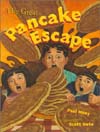New in the Lesson Bank...
The Lesson Bank is a user-supported clearinghouse for on-line lesson plans. Over 2000 lessons have been submitted by teachers around the world. Contribute your favorite lesson ideas and help support teachers everywhere!
FEATURED LESSON

#2590 -
Rhyming With Pancakes
by Paul Many
http://homepages.utoledo.edu/pmany
Subject: Language
Level: Elementary
Materials Required: 1)Picture book: The Great Pancake Escape by Paul Many and Scott Goto (Walker, 2002)
Activity Time: One 45 minute session
Rhyming With Pancakes
Concepts Taught: Students will develop an understanding of the concept of rhyme and rhyming and how rhyme is used.
Objectives:
When the lesson is completed, students will be able to:
- Provide examples of simple words that rhyme with other simple words.
- Supply an end word that rhymes with an end word from an earlier line in a poem.
- State why rhyme may be used.
- State where rhyme may typically be used.
Materials:
- Children's picture book: The Great Pancake Escape by Paul Many and Scott Goto (illustrator), Walker & Co, (NY, 2002) ISBN 0-8027-8795-9
- Dittos with prompt words for rhyming such as those listed below and a blank line after each.
Set/Initiation:
- Have students sit together on the floor as a group. Start by asking if they know of any words that sound like the word "hat"? List the words they come up with on a chalkboard (or overhead). [mat, cat, sat, fat, brat, that]
- Explain to them that words that sound alike or repeat the same sound at their ends are said to rhyme.Spell this word out and write it on the chalkboard.
- Explain that rhymes are often used in poems and songs because they sound good and they help people remember the next line. Show them the book The Great Pancake Escape and read the first verse out loud. Ask students which of the words sound alike and explain that they therefore rhyme.
- Repeat the first verse, stopping before the last word and asking them to supply it. Explain that they were able to remember the last word more easily because it rhymed.
- Repeat this procedure with the second verse.
- Read the book through, stopping every other page or so to elicit from students which words rhyme.
- You may also wish to occasionally repeat a verse and have students supply the last word.
Activity/Procedure
- After reading the book ask if anyone knows how pancakes are made and what ingredients [other foods] go into making them.
- List these ingredients on a chalkboard or overhead.
- Ask if anyone knows what utensils [kitchen tools or things in the kitchen] are used in making them.List these as above.
- Using dittoed handouts on which you have printed the words below, have students individually come up with rhymes for the words listed, or other words they may have volunteered. (Potential rhyming words are in brackets)
bowl: [hole, coal, roll, mole, pole, sole/soul]
spoon: [baboon, cartoon, dune, moon, noon, goon, June, raccoon]
flour: [hour, our, sour]
egg; [beg, leg, peg]
milk: [silk. ilk--not many others]
butter: [apple butter, bread-and-butter, clutter, gutter, peanut butter, shutter]
pan: [an, Ann, bedpan, bran, Dan, fan, flan, Japan, man, pecan, pelican, plan, tan, van.]
spatula: [hula, Ashtabula]
flipper: [dipper, zipper, hipper, gripper, nipper]
stove: [cove, dove, drove, grove, wove]
syrup: [cheer up, I give up]
batter: [chatter, clatter, fatter, matter, patter]

Click the image for a printable version
Closure:
Ask students to tell you:
- In their own words what "rhyme" means. (Knowledge)
- Why rhyme is used. [Sounds "funny/good." Helps to remember.] (Comprehension)
- Why they might use a rhyme in making a poem or song. (Application)
- If the words "hat" and "pan" rhyme. (Analysis)
- If they think the story you just read would be as much fun or they would remember it as well, if it were not rhymed. (Synthesis)
- If they like the using rhyme and why or why not? (Evaluation)
Extended Activities:Introduce other rhyming picture books in the classroom following procedures as above.
Other Resources:
Rhyming Dictionary by Sue Graves, B. Moses and Tim Archibald (Illustrator)Barron's Educational Series (2001)ISBN: 0764119648 Rhyming dictionary specifically designed for younger children.
RECENT LESSON PLANS SUBMITTED...
Compilation 4 Blocks Interview Techniques Gr. 2 Second Grade (Elementary,4 Blocks)
So you want to sue? (Senior,Social Studies)
Popular Music in the Foreign Language Class (all,Language)
5 Themes, "U Select" (all,Geography)
Color mixing (Kindergarten,)
Beginning the year, for teachers (all,other)
Shakespeare and the Web (Advanced,Literature)
Producing Imitation Stained Glass with Help from the Compute (all,Art)
Transition Needs (Senior,)
Money Denominations (Elementary,Mathematics)
lesson five (Elementary,Social Studies)
Jefforsonian Period (Senior,History)
Edgar Allan Poe Webquest (Senior,Literature)
What's the Solution? (Elementary,Science)
Ultimate Sponge Ball (Middle,Phys Ed)
Cardiovascular Fitness (Middle,Phys Ed)
Bringing Physical Education Home (Middle,Phys Ed)
My Music Box (Elementary,Music)
Finding Your Way (Elementary,)
Found Fiction (all,Reading/Writing)
Coin identification (Kindergarten,Mathematics)
Iditarod Background (Middle,Reading/Writing)
Iditarod Background Lesson (Middle,Reading/Writing)
Multiplication Facts Drill (all,Mathematics)
Christmas Around the World (Kindergarten,Social Studies)
Linguistic Legos (Middle,Language)
Candy diciples (all,Games)
#373 Valentine Village (all,)
The magic box (Senior,)
Riesgo(Jeopardy) (Senior,Language)
More Lesson Plans...
|

